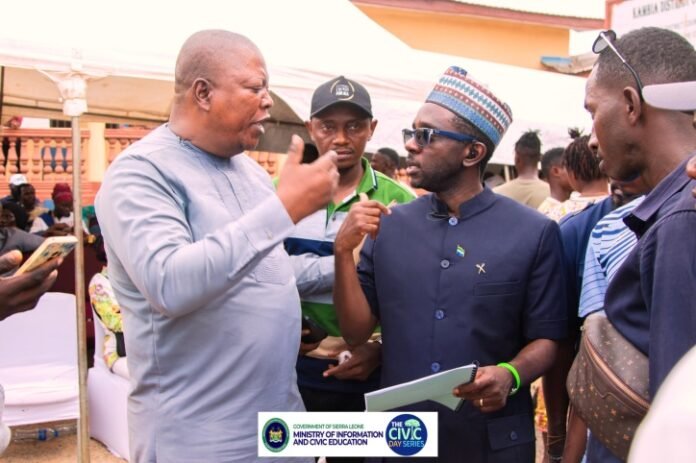Kambia town came alive on Monday, March 24th, and Tuesday, March 25th, as the Ministry of Information and Civic Education (MOICE) launched the first Civic Day activities in the district, bringing governance closer to the people. Normally bustling as a border crossing hub with Guinea at Gbalamuya, Kambia stood still as the MOICE team engaged residents in a dynamic and enlightening two-day event.
Under the theme: “Salone Big Pass We All,” Minister of Information and Civic Education, Chernor Bah, emphasized the significance of national unity as enshrined in the country’s National Pledge and Anthem. The initiative, he explained, aimed to bridge the gap between the Government and the people, fostering civic awareness and engagement.
The first day saw schoolchildren from primary and secondary schools across the district gathering at the Kambia District Council hall. They were joined by Paramount Chiefs, civil society activists and media representatives to gain firsthand insight into the roles of Government and the responsibilities of citizens in ensuring accountability and effective governance. The event provided a platform for residents to voice their perspectives on civic duties and their expectations of Government engagement.
A highlight of the day was an engaging quiz and debate competition, where pupils demonstrated their knowledge on national and international affairs. Pupils from Kolenten and Mortala schools captivated the audience with their intellectual depth, while female pupils, in particular, showcased exceptional prowess, reaffirming President Julius Maada Bio’s steadfast commitment to girls’ education. The debate centered on the merits of Free Quality Education versus the Feed Salone initiative, with compelling arguments presented on both sides. Ultimately, Fatmata Yansaneh emerged victorious for her persuasive advocacy on the benefits of free quality education.
Minister of Communications, Technology and Innovation, Salima Bah, delivered an inspiring address on her Ministry’s transformative efforts in expanding internet access and affordability. She highlighted investments in fiber optic infrastructure, underground cables and broadband expansion, underscoring the Government’s commitment to digital inclusivity. Meanwhile, Statistician General, Mr. Johnny, educated attendees on the civic importance of participating in the national census, setting the stage for a more in-depth discussion the following day.
The presentation of prizes and certificates to outstanding participants marked the culmination of a vibrant first day.
Day two saw a high-profile gathering of Government officials engaging in direct dialogue with citizens from all walks of life, including traditional leaders, civil society representatives and students. Ministers, Directors and Commissioners emphasized that governance is a shared responsibility and that citizens are integral to the decision-making process.
Minister Chernor Bah reiterated President Bio’s directive that officials must step beyond their desks in Freetown and connect with the people who entrusted them with leadership. Other speakers included Minister of Local Government and Community Affairs Tamba Lamina, Deputy Minister of Agriculture I Theresa Dicks, Chairman of the Presidential Initiative on Climate Change, Renewable Energy, and Food Security Alhaji Dr. Kandeh Yumkella, Attorney General and Minister of Justice Alpha Sesay Esq., Head of the National Public Health Agency Dr. Sahr Foday, Statistician General Mr. Johnny, Assistant Commissioner for Border Control Mr. Amara and Deputy Minister of Energy I Ing. Nuni, among others.
Each speaker addressed critical issues, from food security and energy to border control, public health, justice and national development. The audience listened attentively, absorbing insights on policies and governance. However, some residents expressed frustration, voicing their concerns with a mix of anxiety and urgency. Minister Chernor Bah, ever composed and engaging, skillfully transformed tension into constructive dialogue, ensuring that concerns were addressed with clarity and empathy.
By the end of the event, attendees departed with a sense of fulfillment, having engaged directly with Government officials, voiced their grievances and gained deeper insight into national policies. The Civic Day initiative proved to be an invaluable exercise in participatory democracy, reinforcing the Government’s commitment to transparency, inclusion and effective governance. It was a resounding success, leaving both officials and citizens with a renewed sense of collaboration and purpose.




